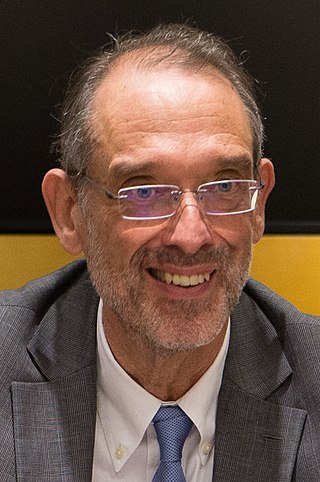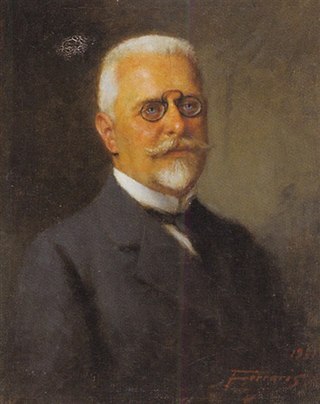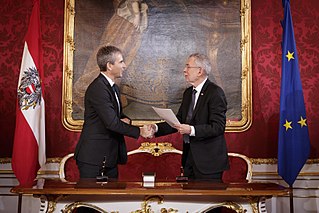External links
- Christian Broda in the German National Library catalogue
Christian Broda (born 12 March 1916 in Vienna, died 1 February 1987 in Vienna) was an Austrian lawyer and politician of the Social Democratic Party of Austria. He served as Minister of Justice of Austria from 1960 to 1966 in the third cabinet of Julius Raab, and again as Minister of Justice in the cabinet of Bruno Kreisky from 1970 to 1983. He was awarded the European Human Rights Prize of the Council of Europe in 1986.

Karl Renner was an Austrian politician and jurist of the Social Democratic Workers' Party of Austria. He is often referred to as the "Father of the Republic" because he led the first government of German-Austria and the First Austrian Republic in 1919 and 1920, and was once again decisive in establishing the present Second Republic after the fall of Nazi Germany in 1945, becoming its first President after World War II.

The president of Austria is the head of state of the Republic of Austria. Though theoretically entrusted with great power by the Constitution, in practice the president is largely a ceremonial and symbolic figurehead.

Bruno Kreisky was an Austrian social democratic politician who served as Foreign Minister from 1959 to 1966 and as Chancellor from 1970 to 1983. Aged 72 at the end of his chancellorship, he was the oldest Chancellor after World War II. His 13-year tenure was the longest of any Chancellor in republican Austria.

Kurt Alois Josef Johann von Schuschnigg was an Austrian Fatherland Front politician who was the Chancellor of the Federal State of Austria from the 1934 assassination of his predecessor Engelbert Dollfuss until the 1938 Anschluss with Nazi Germany. Although Schuschnigg accepted that Austria was a "German state" and that Austrians were Germans, he was strongly opposed to Adolf Hitler's goal to absorb Austria into the Third Reich and wished for it to remain independent.
The Heimwehr or Heimatschutz was a nationalist, initially paramilitary group operating in Austria during the 1920s and 1930s that was similar in methods, organization, and ideology to the Freikorps in Germany. It was opposed to parliamentary democracy, socialism and Marxism. Some of its regional groups also opposed Nazism while others favored it. In spite of its anti-democratic stance, the Heimwehr developed a political wing called the Heimatblock that was close to the conservative Christian Social Party and took part in both the cabinet of Chancellor Carl Vaugoin in 1930 and in Engelbert Dollfuss' right-wing government from 1932 to 1934. In 1936 the Heimwehr was absorbed into what was at the time the only legally permitted political party in Austria, the Fatherland Front, and then later into the Frontmiliz, an amalgamation of militia units that in 1937 became part of Austria's armed forces.

Rudolf Ramek was an Austrian Christian Social politician, who served as Chancellor of Austria from 1924 to 1926.

Hans Köchler is a retired professor of philosophy at the University of Innsbruck, Austria, and president of the International Progress Organization, a non-governmental organization in consultative status with the United Nations. In his general philosophical outlook he is influenced by Husserl and Heidegger, his legal thinking has been shaped by the approach of Kelsen. Köchler has made contributions to phenomenology and philosophical anthropology and has developed a hermeneutics of trans-cultural understanding that has influenced the discourse on the relations between Islam and the West.

The Government of Austria is the executive cabinet of the Republic of Austria. It consists of the chancellor, who is the head of government, the vice chancellor and the ministers.

Michael Mayr was an Austrian politician, who served as Chancellor of Austria in the First Austrian Republic from July 1920 to June 1921. He was a member of the Christian Social Party, and by profession a historian.

The Fatherland Front was the right-wing conservative, nationalist and corporatist ruling political organisation of the Federal State of Austria. It claimed to be a nonpartisan movement, and aimed to unite all the people of Austria, overcoming political and social divisions. Established on 20 May 1933 by Christian Social Chancellor Engelbert Dollfuss as the only legally permitted party in the country, it was organised along the lines of Italian Fascism, except that the Fatherland Front was fully aligned with the Catholic Church and did not advocate any racial ideology, as later Italian Fascism did. It advocated Austrian nationalism and independence from Germany on the basis of protecting Austria's Catholic religious identity from what they considered a Protestant-dominated German state.

The Akademisches Gymnasium is a state gymnasium school located in Vienna, Austria. Founded by the Jesuits in March 1553, it is the oldest secondary school in Vienna and is now nondenominational and non-feepaying. The school offers a humanistic education and is known to be rather liberal compared to other traditional secondary schools in the city. Currently, there are approximately 600 pupils in 24 classes.

Johannes "Johann" Schober was an Austrian jurist, law enforcement official, and politician. Schober was appointed Vienna Chief of Police in 1918 and became the founding president of Interpol in 1923, holding both positions until his death. He served as the chancellor of Austria from June 1921 to May 1922 and again from September 1929 to September 1930. He also served ten stints as an acting minister, variously leading the ministries of education, finance, commerce, foreign affairs, justice, and the interior, sometimes just for a few days or weeks at a time. Although Schober was elected to the National Council as the leader of a loose coalition of Greater German People's Party and Landbund near the end of his career, he never formally joined any political party. Schober remained the only chancellor in Austrian history with no official ideological affiliation until 2019, when Brigitte Bierlein was appointed, becoming the first woman to take office.

Maximilian Hussarek von Heinlein, ennobled to the rank of Baron (Freiherr) in 1917, was an Austrian statesman who served as the penultimate Minister-President of Cisleithania in the last stage of World War I, for three months in 1918.
Engelbert Broda was an Austrian chemist and physicist suspected by some to have been a KGB spy code-named Eric, who could have been a main Soviet source of information on British and American nuclear research.
Egmont Foregger was an Austrian jurist, official and politician.

Wolfgang Brandstetter is an independent Austrian politician and legal scholar who served as a member of the Constitutional Court of Austria from 2018 to 2021. He previously served as the Minister of Justice of Austria, as well as the country's Vice Chancellor.

Heinz Faßmann is an Austrian politician and professor of human geography and land-use planning at the University of Vienna. He served as the Minister of Education in the Second Kurz cabinet in the government of Chancellor Sebastian Kurz and the Schallenberg government of Chancellor Alexander Schallenberg. He previously served in the same capacity from December 2017 to June 2019: he was succeeded in the post by Martin Polaschek in December 2021. Faßmann is considered to be aligned with the Austrian People's Party (ÖVP) but holds no formal party membership or affiliation.

The second Schober government was a short-lived coalition government, chaired by Johannes Schober, that led the First Austrian Republic from January 27, 1922, to May 31, 1922. The government was supported by the same right-of-center alliance of Christian Social Party and Greater German People's Party that had underpinned the first Schober government. In terms of personalities, it was virtually identical to the Breisky government that had replaced Schober's first cabinet for a single day after the alliance had temporarily broken down, the People's Party having become disaffected with Schober over his foreign policy. Schober never fully regained the People's Party's trust and was unseated for a second time a mere four months later.

In Austria, a minister is a member of the Cabinet that usually leads a ministry or a division of the Chancellery.